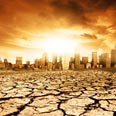
Scientists urge action on world's water, energy problems
Experts from 15 nations lobby world leaders to join resources in fight for environmental protection, preservation
The joint statement by some of the world's leading science academies was issued on Thursday ahead of the G8 summit in the United States. It is part of the annual lobbying effort aimed at focusing the attention of world leaders on issues the scientific community regards as crucial.
For the first time, the scientists argue that looming shortages in water and energy supplies should be treated as a single issue.
"Major stresses on availability of energy and water are already being felt in many countries and regions and more are foreseeable," the joint statement said.
Fossil fuel, nuclear and hydropower are still providing the bulk of the world's energy and they all rely heavily on the supply of water for cooling, running steam turbines or direct power generation. Conversely, large amounts of energy are used in pumping, purifying and desalinating water around the globe.
"Without considering water and energy together, inefficiencies will occur, increasing shortages of both," the statement warns. Politicians should pursue policies that integrate the two and emphasis the need for conservation, efficiency and cooperation across national borders.
'Disasters certain to happen'
The world also needs to increase its resilience against disasters like those which result from tsunamis, earthquakes and levees that fail in the face of rising sea levels.
"Disasters are absolutely certain to happen," Michael Clegg of the US National Academy of Sciences told Reuters, adding growth in the global population, from $7 billion now, was focused on coastal areas that are more vulnerable, making it "more important that we design for resilience."
The scientists said global annual losses from natural disasters exceeded $200 billion in 2005, 2008 and 2011 but loss of life was generally much lower in developed countries.
Governments should focus efforts on improving public health systems, strengthening building standards and better information technology that enables faster warnings and response.
Signatories of the statement are from the leading science academies in the United States, Russia, China, Britain, Brazil, Canada, France, Germany, India, Indonesia, Italy, Japan, Mexico, Morocco and South Africa.










